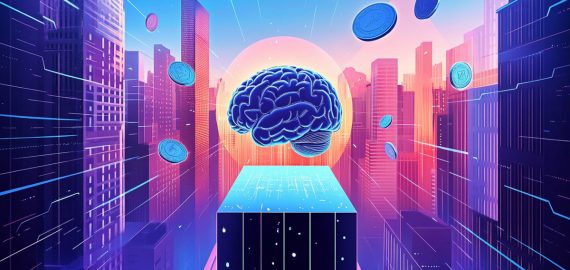What Tech Leaders Seek in Artificial Intelligence? Tech Visionaries Share Insights


In Brief
a16z highlights the transformative power of AI, comparing it to historical technology shifts like electricity and microchips. The rapid evolution of foundational large language models (LLMs) and their economic incentives drive market transformation.
The report explores central questions about AI, such as the choice between general AI models and specialized ones. It also addresses challenges in enterprise adoption, the impact of scaling laws on AI capabilities, and the evolving role of humans in AI innovation.

In its recent report, “What Builders Talk About When They Talk About AI,” Andreessen Horowitz’s venture capital firm a16z, explored how AI is reshaping industries like art, medicine, gaming, and more. The firm shared the key takeaways from discussions with AI experts, offering a glimpse of the transformative potential of AI.
“I really think that we could be entering a third epoch of computing. The microchip brought the marginal cost of compute to 0. The internet brought the marginal cost of distribution to 0. These large models actually bring the marginal cost of creation to 0. When those previous epochs happened, you had no idea what new companies were going to be created. Nobody predicted Amazon. Nobody predicted Yahoo. We should all get ready for a new wave of iconic companies,”
said Martin Casado, general partner at a16z.
Drawing parallels to the adoption of electricity and the microchip, experts emphasized that the industry is only beginning to grasp the full scope of this technological revolution. The development of foundational large language models (LLMs), such as ChatGPT, has been a focal point, but the journey toward a comprehensive tech stack for generative AI is anticipated to span years, if not decades.
“Particularly over the past couple of years and maybe the past 12 months in particular, with the launch of ChatGPT and GPT-4, you can really see the potential of the platform in the same light as the personal computer or the smartphone. A bundle of technologies are going to make a whole bunch of new things possible that lots of people are going to be building things on top of,” said Kevin Scott, Chief Technology Officer at Microsoft.
Economic incentives drive rapid adoption and development, positioning AI as a catalyst for market transformation.
“In the current AI wave, we have already seen early signs of economics that are 10,000x (or higher) better for some use cases, and the resulting adoption and development of AI appears to be happening much faster than any previous shift,” a16z wrote.
The Vast Potential of AI
In creativity, AI’s ability to generate content that prioritizes creativity over correctness is harnessed in various applications, from virtual friends to game design. Entertainment, in particular, stands to benefit from the technology’s imaginative capabilities.
“Right now, we’re at a place where AI might be doing the first draft, but getting from first draft to final product is kind of hard and usually takes a team. But if you could get AI to suggest interface elements to people and do that in a way that actually makes sense, I think that could unlock a whole new era of design in terms of creating contextual designs that are responsive to what the user’s intent is at that moment,” said Dylan Field, co-founder of the vector graphics editing software company Figma. “And I think that’d be a fascinating era for all designers to be working in collaboration with these AI systems.”
Coding “copilots” are among the first AI assistants to gain widespread adoption, primarily due to the unique combination of developer adoption, rich coding datasets and their iterative nature of coding tasks. Human-AI collaboration is seen as key to achieving correctness in AI-driven development.
AI’s future also anticipates larger context windows, allowing AI models to retain more information and perform more complex tasks. This expanded memory will be a game-changer in various domains, from document analysis to information retrieval, the report found.
“Programming is becoming less abstract. We can actually talk to computers in high bandwidth in natural language. We’re using the technology and the technology is helping us understand how to collaborate with it versus ‘program’ it,”
said Mira Murati, CTO of OpenAI.
Moreover, a16z claims that to unlock the full potential of transformer-based LLMs, which excel at general reasoning, it’s crucial to put these models in the hands of users and understand their practical applications.
While LLMs are versatile, their specific use cases are not automatically evident. Similar to the role of humans in reinforcement learning with human feedback (RLHF), getting users to interact with and utilize this new technology is essential for discovering novel applications beyond their foundational capabilities.
Entrepreneurs must focus on understanding their users’ needs and problems to determine how AI can effectively address them.
Multimodal AI and embodied AI, which enable AI interaction through voice, images and even physical actions, are emerging as pivotal areas of research. These innovations promise to provide users with a richer, more immersive experience when interacting with AI models.
In other disciplines, such as biology, artificial intelligence presents an opportunity to advance healthcare and disease treatment. While biology’s complexity often challenges human understanding, experts argue that AI can unlock hidden insights and drive transformative medical breakthroughs.
By measuring biology at an unprecedented scale, from cellular to organism levels, AI – powered by machine learning and data science, now enables us to comprehend vast datasets and engineer biology through tools like CRISPR genome editing.
This convergence signifies a new era of digital biology, promising meaningful applications and language models tailored to biological understanding.
Key Developments Shaping the Future of Artificial Intelligence
One of the central dilemmas revolves around the choice between a few general AI models or a multitude of specialized models. The answer, it seems, depends on factors, such as cost, accuracy, and latency tolerance, which may evolve as researchers discover more efficient ways to fine-tune foundation models for specific use cases.
“In the long run, we may be over rotating on the question of which models are used for which use case because we are still in the early stages of building the infrastructure and architecture that will support the wave of AI applications to come,”
a16z stated.
Meanwhile, the transition to AI-powered solutions in the enterprise faces hurdles, including data ownership concerns and the complexity of building custom LLMs. These challenges, however, are met with a growing demand for specialized, high-accuracy models.
Scaling laws, which govern model performance improvements with increased data and computing, are a driving force in artificial intelligence. As artificial intelligence models become more powerful, they unlock emerging capabilities, often with significant reliability improvements.
“Even if there were no algorithmic improvements from here and we just scaled up what we had so far, the scaling laws are going to continue,”
said Dario Amodei, co-founder and CEO of Anthropic.
Experts said that definition of progress toward artificial general intelligence (AGI) remains elusive, with traditional benchmarks and tests raising questions about their ability to measure AI’s reasoning capabilities effectively.
The report revealed that the role of humans in AI’s future is pivotal, as technology augments rather than replaces human work, opening new possibilities and fields.
According to a16z and the industry’s experts, there has never been a more exciting time to engage in AI innovation, with physicists and mathematicians finding their skills particularly valuable in this rapidly evolving landscape.
Read more:
- A16Z: How generative AI is revolutionizing game development
- U.S.-based gamers rarely play VR games, survey by a16z suggests
- Andreessen Horowitz launches a Crypto Startup School
- The dangers of AI: How hackers will use ChatGPT in the next few years
Disclaimer
In line with the Trust Project guidelines, please note that the information provided on this page is not intended to be and should not be interpreted as legal, tax, investment, financial, or any other form of advice. It is important to only invest what you can afford to lose and to seek independent financial advice if you have any doubts. For further information, we suggest referring to the terms and conditions as well as the help and support pages provided by the issuer or advertiser. MetaversePost is committed to accurate, unbiased reporting, but market conditions are subject to change without notice.
About The Author
Agne is a journalist who covers the latest trends and developments in the metaverse, AI, and Web3 industries for the Metaverse Post. Her passion for storytelling has led her to conduct numerous interviews with experts in these fields, always seeking to uncover exciting and engaging stories. Agne holds a Bachelor’s degree in literature and has an extensive background in writing about a wide range of topics including travel, art, and culture. She has also volunteered as an editor for the animal rights organization, where she helped raise awareness about animal welfare issues. Contact her on [email protected].
More articles

Agne is a journalist who covers the latest trends and developments in the metaverse, AI, and Web3 industries for the Metaverse Post. Her passion for storytelling has led her to conduct numerous interviews with experts in these fields, always seeking to uncover exciting and engaging stories. Agne holds a Bachelor’s degree in literature and has an extensive background in writing about a wide range of topics including travel, art, and culture. She has also volunteered as an editor for the animal rights organization, where she helped raise awareness about animal welfare issues. Contact her on [email protected].


















































